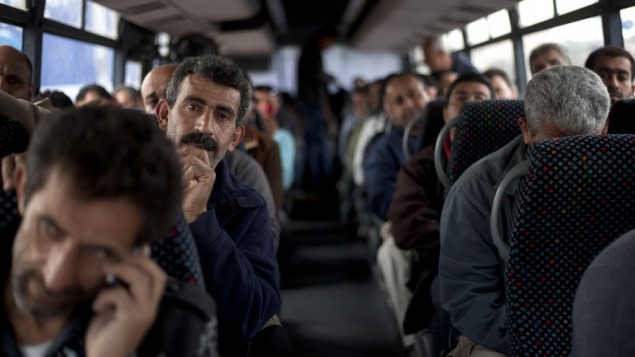Jeffrey Goldberg is a national correspondent for The Atlantic and a recipient of the National Magazine Award for Reporting. Author of the book Prisoners: A Story of Friendship and Terror, Goldberg also writes the magazine’s advice column.
Israeli authorities on the West Bank have established a pair of “Palestinian only” bus routes, meant to take Arab residents of the West Bank to their jobs in Israel. The Israelis say this was done for reasons of efficiency — more and more Palestinians are working in Israel, and their communities are currently ill-served by existing bus lines. Critics say that the lines were established because Jewish settlers who live in neighboring communities don’t want to ride buses with Palestinians. Both arguments are probably true.
These bus lines are, of course, an embarrassment to Israel, but I do not think their establishment is significant beyond their obvious symbolism. Why? Because they represent only one symptom of the real problem, which is that Israel cannot not, and should not, maintain two separate systems — separate-but-equal, or separate-but-unequal — for Jewish residents of the West Bank, and Arab residents of the West Bank.
The actual issue is this: Jewish residents of Hebron, to take a vivid example, are Israeli citizens, and they have the franchise — they are full citizens of the state that governs their lives. Their Palestinian neighbors — quite literally neighbors, in the case of Hebron, because Arabs and Jews there sometimes live within 10 or 15 feet of each other — fall under a different set of rules. Though the Palestinians in the West Bank have varying degrees of self-government, their lives are still controlled in many ways — their freedom of movement, most obviously — by a government that they do not get to choose. This is the confounding dilemma created by the movement of Jewish settlers into the West Bank, and the refusal of Israel to extend voting rights to the Palestinians it inherited after the Six-Day War.
Remember, the occupation itself was originally justifiable: Jordanian forces fired on Israel from the West Bank, and Israel subsequently took the territory from which it was being assaulted. It was when some Israelis succumbed to messianic temptation and moved to the West Bank, with the help of successive Israeli governments, that the true problem began.
Israel faces only two choices here: It can offer citizenship to the Palestinians whose lives are affected by its decisions, or it can negotiate an end to settlement, especially the far-flung settlements that project deeply into the West Bank, and then work toward the creation of a Palestinian state. Will Jews be allowed to live and pray in that Palestinian state? I certainly hope so; it would be a crime to deny Jews access to their holy sites. Hebron is Judaism’s 2nd-holiest city, Jews lived there for millenia until they were massacred by some of their Arab neighbors (other Arabs played a role in the rescue of the remnant of the Jewish community) and Jews quite obviously have a right to live in all parts of their historic homeland.
That said, the Jewish state cannot maintain a double-standard in these areas, because it is also a crime to deny people full enfranchisement based on their ethnicity. Most Israelis want to maintain their country as a Jewish state, and as a Jewish haven. Jews, because they are an ancient people, and because they have suffered at the hands of Christians and Muslims for centuries, have earned the right to independence. Having finally earned the privilege of Jewish autonomy, Israelis do not want to become citizens of the world’s 23rd Arab-majority state. But eventually, if the Palestinians of the West Bank aren’t freed from Israeli domination, that is what they will become.
Original text : http://www.theatlantic.com/international/archive/2013/03/why-the-new-palestinian-only-bus-lines-are-not-a-big-deal/273713/






